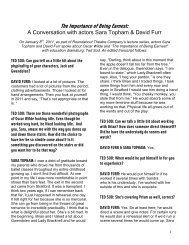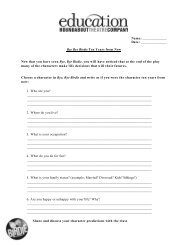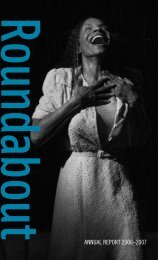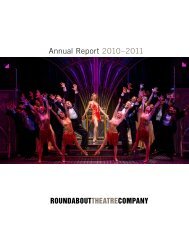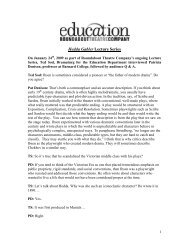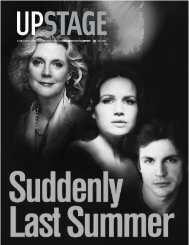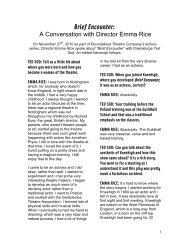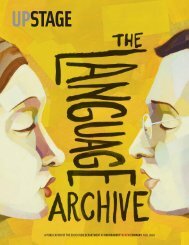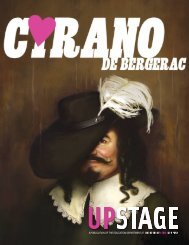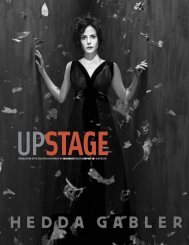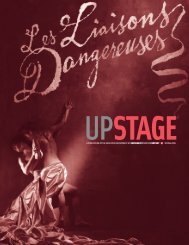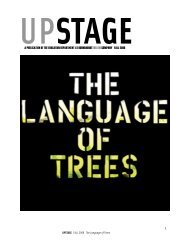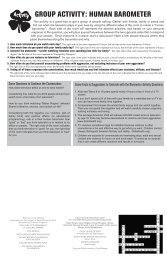The Importance of Being Earnest - Roundabout Theatre Company
The Importance of Being Earnest - Roundabout Theatre Company
The Importance of Being Earnest - Roundabout Theatre Company
You also want an ePaper? Increase the reach of your titles
YUMPU automatically turns print PDFs into web optimized ePapers that Google loves.
SATIRE: Seeks public reform, improved standards, or a heightened<br />
awareness <strong>of</strong> a corrupt society. Irony, wit, exaggeration and<br />
extremes all help to raise audience awareness. Satire sometimes<br />
uses strong character types as targets <strong>of</strong> critique instead <strong>of</strong> identifying<br />
specific people. <strong>The</strong> author relies on the audience to recognize<br />
“clues” in order to understand the target <strong>of</strong> the satire.<br />
COMEDY OF MANNERS: Portrays the manners, conventions<br />
and stylized fashions <strong>of</strong> the upper classes in an artificial,<br />
sophisticated society. Romantic plots <strong>of</strong>ten turn on illicit or amoral<br />
romantic affairs. Humor is expressed through witty language,<br />
character “types” (such as fops or jealous husbands) and making fun<br />
<strong>of</strong> characters who fail to conform to the conventional attitudes and<br />
manners <strong>of</strong> an elegant society.<br />
FARCE: Broad physical comedy, built on tightly constructed<br />
plots about middle-class characters. Exaggerated situations (<strong>of</strong>ten<br />
about love, sex, and money) push characters to rush at frantic<br />
paces, slamming doors and hiding in closets. Farce builds to<br />
absurd situations, but in the end, stability <strong>of</strong> relationships and class<br />
hierarchy is restored.<br />
<br />
INVERSION: the reversal <strong>of</strong> words from their expected order in<br />
a sentence. Wilde uses inverted statements to satirize Victorian<br />
morality and society. Algernon’s remark, “Divorces are made in<br />
Heaven,” undermines the institution <strong>of</strong> marriage by inverting the<br />
popular saying that “marriages are made in heaven.” When Jack<br />
declares “It is a terrible thing for a man to find out suddenly that<br />
all his life he’s been telling nothing but the truth,” Wilde comments<br />
upon the hypocrisy <strong>of</strong> this society.<br />
EPIGRAM: a short, witty, and <strong>of</strong>ten paradoxical saying (example:<br />
“A stitch in time saves nine”). Epigrams allow Wilde to display his<br />
own mastery <strong>of</strong> language, literature, and life and to challenge the<br />
wit <strong>of</strong> his listener.<br />
<br />
<br />
<br />
<br />
<br />
<br />
<br />
<br />
<br />
<br />
<br />
<br />
<br />
<br />
<br />
<br />
<br />
<br />
<br />
<br />
<br />
<br />
<br />
<br />
<br />
<br />
<br />
<br />
<br />
<br />
<br />
<br />
<br />
<br />
<br />
<br />
<br />
<br />
<br />
<br />
<br />
<br />
<br />
<br />
<br />
<br />
WITTICISM: a clever witty and <strong>of</strong>ten biting or ironic remark.<br />
Nearly every line spoken in the play is a kind <strong>of</strong> witticism.<br />
WORDPLAY: playful use <strong>of</strong> words.<br />
“ Art is the only serious thing in the world.<br />
And the artist is the only person who is never serious.”<br />
UPSTAGE WINTER 2011: THE IMPORTANCE OF BEING EARNEST



